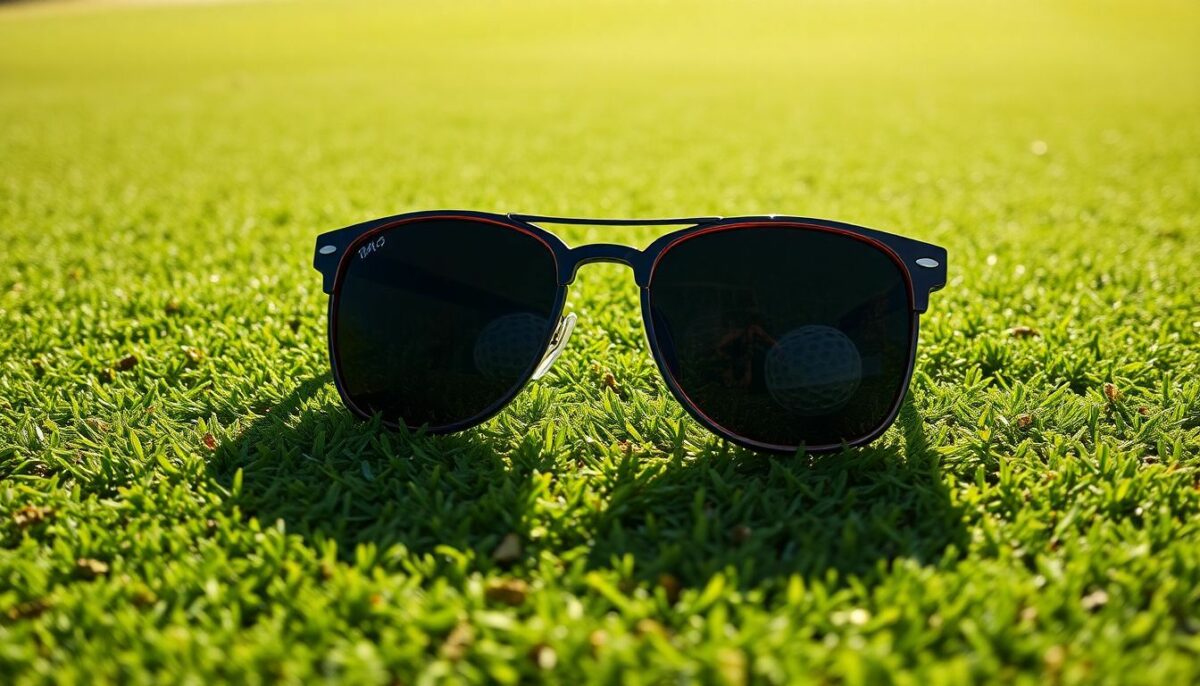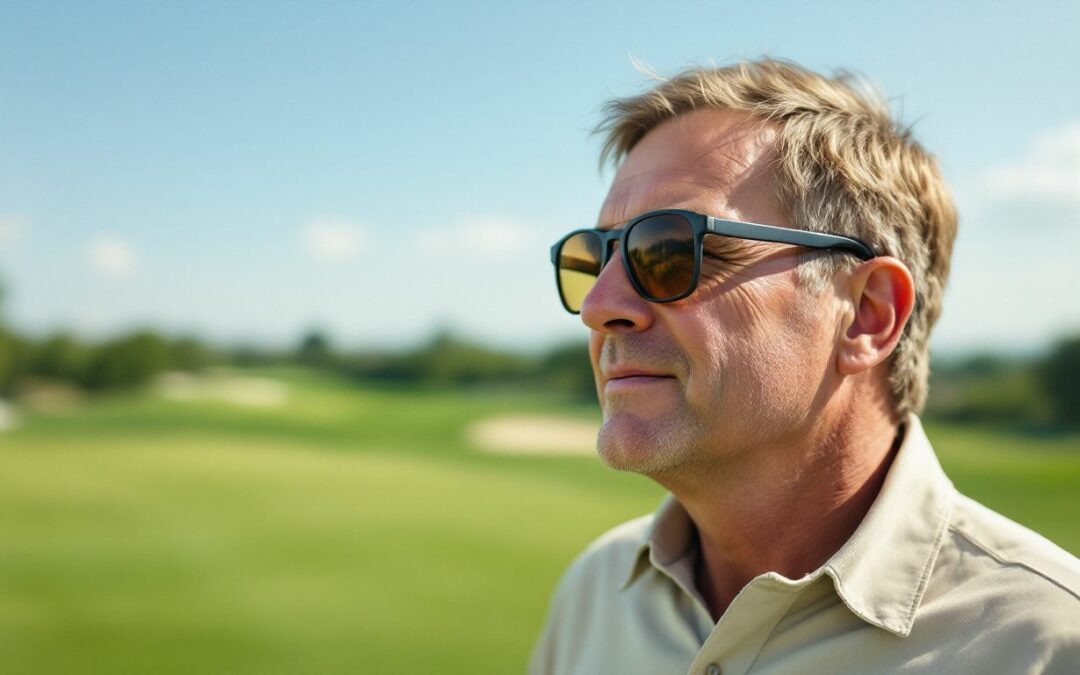Golfers invariably have trouble in distances and other terrains on sunny or cloudy days. For giving a hand to golfers with regards to the way the sunlight affects their vision, the right shades-wearing the especially bronze lenses with proper UV protection, may play a key role.
This article brings in choices of some of the top golf sunglasses giving a hint to the players on how they can clear the vision and achieve better scores in wind and sun all-weather conditions. Check the detailed descriptions of the perfect matching of sunglasses to each type of golfing weather below.
Key Takeaways
- Bronze lenses make your golf game easier—LT16 (letting only 16% of light in) shines brightest on sunny days, while LT33 (33% transmission) gives cloudy days a cheerful lift.
- Oakley Flak 2.0 XL sunglasses rock on bright, sunny rounds; their wraparound frames and glare-fighting polarized lenses keep pesky water reflections at bay.
- Tifosi Optics Crit glasses step up on dull, cloudy mornings; the soft bronze lenses brighten your view, helping you spot tricky slopes on the greens.
- Maui Jim Ho’okipa sunglasses smoothly adjust to shifting weather conditions. Plus, you get a sweet two-year warranty and free online shipping, not bad at all.
- Give your shades some TLC—stick to microfiber cloths, tuck them neatly back into their case after your round, keep screws snug, and don’t cook them on your car dashboard.
Key Features to Consider in Golf Sunglasses

Choosing the right golf sunglasses can make or break your game on the links. Good eye protection shields against UV radiation while proper lens technology helps you spot the ball against different backgrounds.
The right frame design keeps your shades in place during your swing, a must-have feature that many sneakerheads who golf often overlook. Smart golfers pick different tints for sunny days versus overcast conditions, just like pros Henrik Stenson and Rickie Fowler do.
Lens color and contrast enhancement
Lens tint can genuinely make or break how clearly you see the golf course. Bronze, brown, and red shades are great—they sharpen contrast and make it easier to spot the curves and bumps in the fairway.
Scheyden eyewear offers two bronze lens choices popular with golfers: LT16 Bronze lenses allow 16% light through, ideal for those blazing sunny afternoons, and LT33 Light Bronze lenses have 33% transmission for dimmer, cloudy skies.
The right lens color doesn’t just protect your eyes—it transforms how you read the greens.
Many golfers swear by bronze lenses when trying to spot tricky slopes and subtle dips around greens. Better contrast makes it easier for you to track ball flights and get a good sense of distance.
Good golf sunglasses also guard your eyes from nasty UV rays, all while boosting visual clarity. It’s like upgrading your vision from fuzzy TV reception to full HD—without having to squint awkwardly at every hole.
UV protection and polarization
Golfers often soak up long hours of sunshine, putting UV protection high on their list. A solid pair of golf sunglasses blocks damaging rays like UVA, UVB, and even sneaky UVC. Polarized shades are an added bonus.
They cut harsh glare bouncing off water hazards and surfaces like glossy fairways. But there’s a lively debate among golf pros on polarized versus non-polarized lenses. Polarized sunglasses might mess up depth perception, especially around tricky greens.
Scheyden eyewear addresses this concern using advanced lens technology. Their shades keep true color contrasts sharp, reducing the risk of misjudging distance or slope. Bronze-tinted lenses usually do well in typical golf conditions—sunny but not overly bright.
Still, matching your lenses to specific lighting makes the difference between eagle-eyed play and squinting misses. Your eyes will thank you, and maybe your scorecard will too.
Frame design and comfort
UV protection is great, but your golf sunglasses need the right frames too. You’re sweating buckets on hole twelve—frames sliding down your nose is the last thing you need. Good frames grab your face firmly, but without that annoying pinch.
Take the Looper shades: they have a laid-back fit perfect for a casual round with buddies. The CIA Grabber, on the other hand, hugs closer for players tackling serious swings. During tests, Connor mentioned a bit more rubber grip might help heavy sweaters, but both pairs held steady no matter how wild his follow-through got.
Best Golf Sunglasses for Sunny Days: Oakley Flak 2. 0 XL
Oakley Flak 2.0 XL sunglasses save golfers from bright, glaring days on the course. Their wraparound style with LT16 Bronze lenses lets in just 16% of sunlight—ideal for scorching 95°F rounds like Connor endured in Virginia summers.
Polarized lenses cut harsh glare bouncing off water traps and cart paths. Easier ball tracking, clearer greens—that’s the magic these lenses deliver.
The right lens technology doesn’t just protect your eyes—it transforms how you see the game.
These frames won’t budge mid-swing, crafted from light materials built tough for endless rounds. Golfers love the snug fit that holds steady over 18 holes without hurting ears or slipping down noses.
Up next is tackling those frustrating cloudy-day blues out on the links.
Best Golf Sunglasses for Overcast Conditions: Tifosi Optics Crit
Cloudy days on the golf course can turn tracking your ball into a game of hide-and-seek. Even pros like Lydia Ko know the struggle—spotting subtle slopes or tiny breaks on a gloomy afternoon feels like chasing shadows.
That’s where Tifosi Optics Crit steps in. Its LT33 Light Bronze lenses let in 33% of ambient light, brightening your view just enough without washing things out. The bronze tint lifts contrast, making greens feel sharper and cleaner, even on days when the sun plays hooky.
The wraparound shape keeps annoying side glare out of your eyes, and the lightweight frame hugs your face snugly, staying put as you swing. A little cloudiness shouldn’t spoil your tee time—grab the right gear, and you’ll see clearly enough to blame those missed putts on something else.
Best All-Weather Golf Sunglasses: Maui Jim Ho’okipa
Maui Jim Ho’okipa sunglasses are a golfer’s best friend when the weather can’t make up its mind. These lightweight wraparound shades feature bronze lenses that smoothly adapt between sunny mornings and dim afternoons.
Polarized lenses cut intense glare bouncing off water hazards and shiny cart paths. You’ll easily read slopes and contours on tricky greens without squinting or strain. Golfers also get peace of mind from Maui Jim’s two-year warranty included with every pair.
Online buyers even score free shipping and hassle-free returns—talk about a hole-in-one deal.
Tips for Maintaining Your Golf Sunglasses
Golf sunglasses shield your eyes and keep the ball clear as day on the course. Proper care stretches their lifespan and keeps performance sharp. Here’s what you should know:
- Gently wipe lenses daily using a microfiber cloth to clear away fingertips, dirt, and sweat that can harm lens coatings. Avoid tissues or paper towels—they scratch polarized lenses and mess up clarity.
- For lenses, always use cleaning sprays meant specifically for sunglasses. Common household cleaners often contain harsh chemicals that ruin lens treatments. Lukewarm water and mild hand soap do great for easy cleanups.
- Always stash your shades safely in a sturdy case after playing to dodge scratches and bent frames. Premium sunglass makers like Scheyden usually include a sturdy protective case—take advantage of that.
- Skip leaving shades on your car’s dashboard or in sizzling spots. High heat bends frames and wrecks lens tech pretty quickly. Plus, consistent UV exposure can slowly break down lens coatings.
- Give screws a regular check-up and tighten them promptly to avoid lenses popping loose mid-swing. Eyeglass repair kits with tiny screwdrivers make it easy even for clumsy hands.
- Swap out nose pads and earpieces if they’re wearing thin or uncomfortable after several rounds. These little rubber parts tend to give out before frames or lenses ever will.
- After golfing in humid or salty air, rinse wraparound sunglasses with fresh water to stop corrosion or gunk from forming near hinges and frame joints.
- Handle bronze or special golf lenses gently—they have delicate contrast-tinted coatings that scratch easier than regular sunglass lenses.
Conclusion
Choosing good golf sunglasses can seriously elevate your game. They do more than guard against harsh sunrays—they sharpen your vision on sunny afternoons, gloomy mornings, and surprise showers.
Top brands like Oakley, Tifosi, Maui Jim, and Scheyden are golfers’ best pals, thanks to their polarized lenses and handy bronze tints. Polarized lenses cut down glare, helping you spot tricky breaks and slopes on the green.
Bronze lenses improve contrast, highlighting subtle shifts in terrain that might otherwise slip past you.
A friend once swore he knocked two strokes off his round after picking up a solid pair of Scheyden shades—true story. Keep your sunglasses clean with a soft cloth and stash them inside a sturdy case between rounds.
Doing this lengthens their lifespan and keeps you looking sharp from tee-off through the 19th hole.
FAQs
1. What makes golf sunglasses different from regular sunglasses?
Golf sunglasses come with lenses built specifically for golfers. They reduce glare but won’t overly darken the greens or fairways. Brands like Scheyden Eyewear craft frames that don’t budge mid-swing—so no embarrassing slips as you tee-off.
2. Are polarized lenses good for golf?
Polarized lenses are great on sunny days, cutting through harsh glare and helping spot your ball against bright skies. Some golfers, though, notice they’re tricky when judging slopes on greens. Test-drive a pair before committing.
3. Which lens colors work best for different weather conditions?
Bronze lenses perform best in partly sunny conditions—they enhance contrast nicely. Gray lenses are your best bet for bright sunshine, as they keep colors natural and clear. For cloudy days, amber or yellow lenses brighten things up to help spot your ball easily.
4. How important is UV protection in golf eyewear?
UV protection in golf sunglasses isn’t optional—it’s essential. Good quality lenses block 100% of harmful UV rays. Think of it like sunscreen, but for your eyes. Long hours outside demand solid eye protection.
5. What sunglasses does Ian Poulter wear on tour?
Ian Poulter usually rocks premium polarized sunglasses equipped with golf-specific lenses. His choices vary through each season, but he sticks to sturdy frames with advanced lens features. GolfPass e-mails occasionally mention his latest selections—handy if you want to copy his style.

